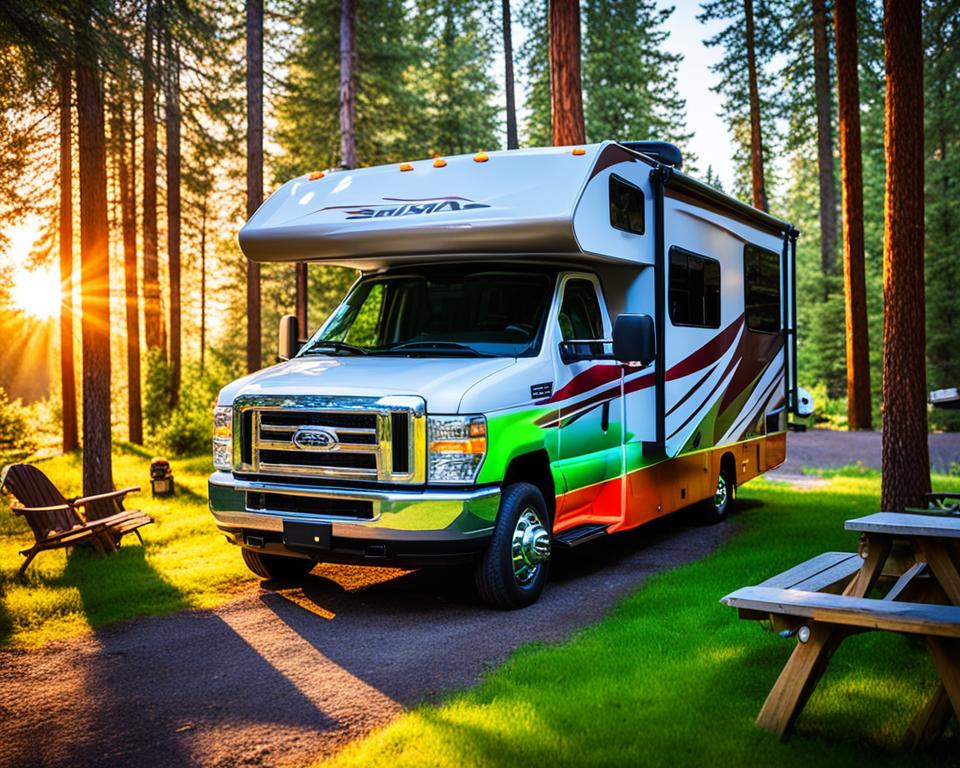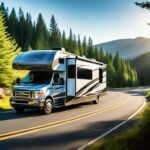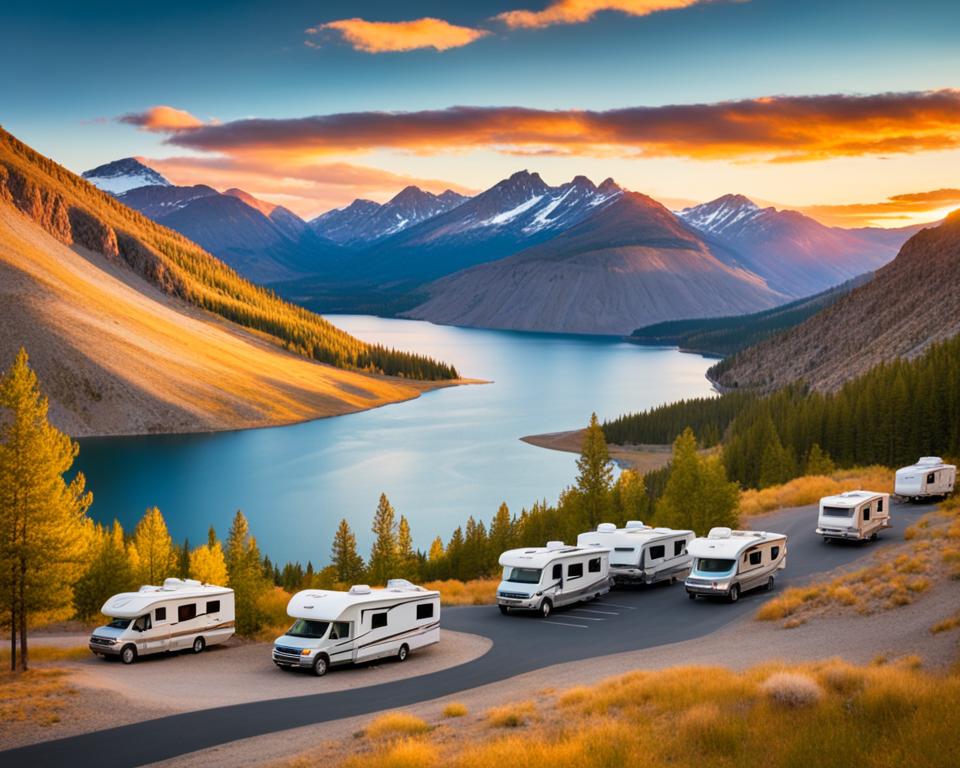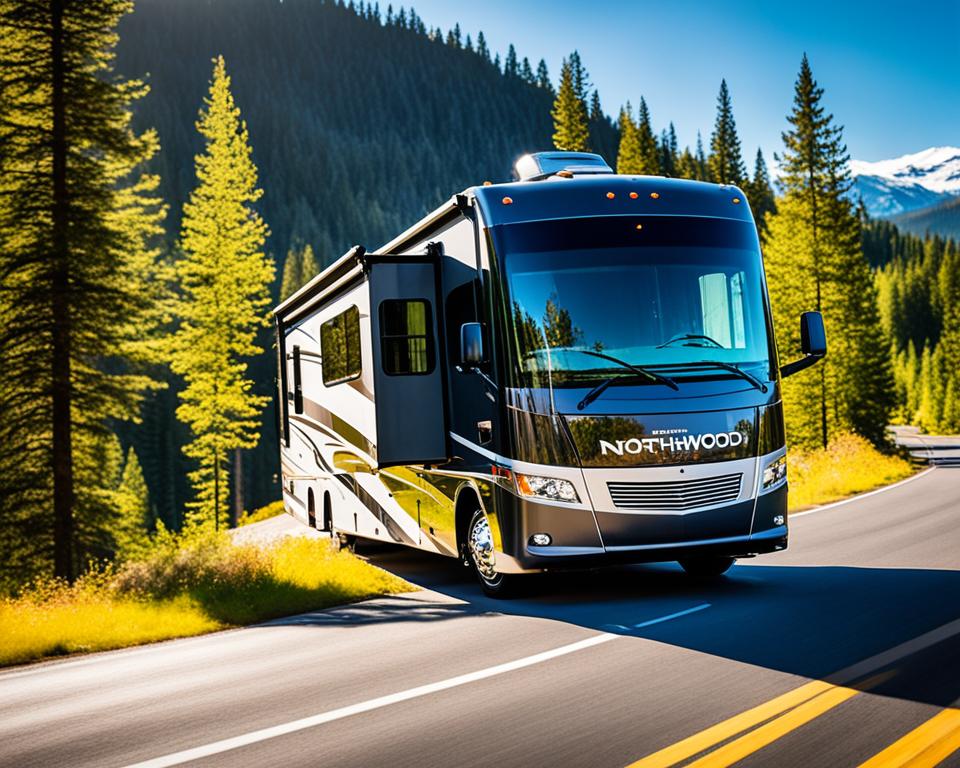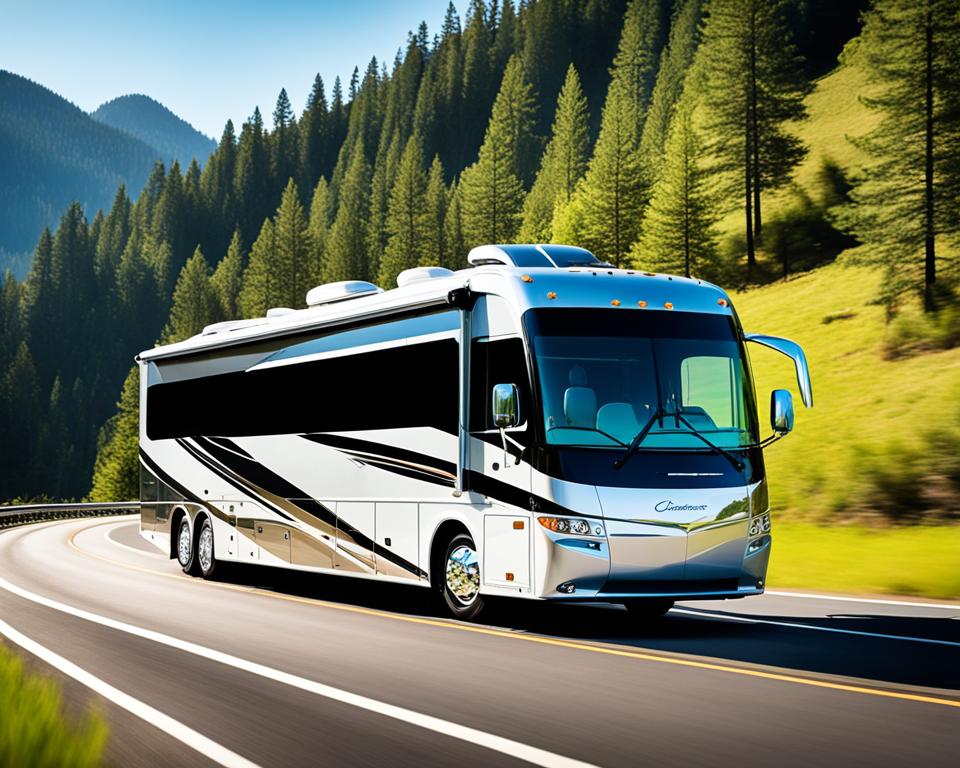A recreational vehicle, commonly known as an RV, is a type of vehicle that is designed for both travel and accommodation purposes. It offers individuals the freedom to explore new destinations while providing a comfortable living space. RVs come in various types, including motorhomes, campers, and fifth wheels, each with its own unique features and advantages.
RVs have become increasingly popular among travel enthusiasts, providing a convenient and cost-effective way to experience the open road. Whether you’re embarking on a cross-country adventure or planning a weekend getaway, an RV can be your home on wheels, allowing you to bring along all the comforts of home.
Key Takeaways:
- RVs are vehicles designed for travel and accommodation purposes.
- There are different types of RVs, including motorhomes, campers, and fifth wheels.
- RVs offer convenience, cost savings, and the ability to bring along all the comforts of home.
- RV travel allows individuals to explore new destinations and create lasting memories.
- An RV can be rented before making a purchase to try out the RV lifestyle.
Types of RVs
When it comes to recreational vehicles (RVs), there are several types that cater to different travel needs and preferences. Whether you’re planning a weekend getaway or embarking on a long-term adventure, understanding the different RV types can help you find the perfect fit for your journey.
Let’s explore the three main types of RVs: motorhomes, campers, and fifth wheels.
Motorhomes
Motorhomes are complete living spaces on wheels. These vehicles combine the driving unit with the living space, creating a seamless travel experience. Motorhomes come in different sizes and classes, ranging from Class A (the largest) to Class C (smaller, more maneuverable). They offer amenities such as bedrooms, bathrooms, kitchens, and living areas, providing all the comforts of home while on the road. With motorhomes, you can have everything you need within reach, making them a popular choice for RV enthusiasts.
Campers
Campers, also known as travel trailers, are towed behind a vehicle and can be detached once you arrive at your destination. These trailers come in various sizes and configurations, ranging from compact trailers to spacious models with slide-out sections for extra room. Campers offer a convenient and flexible way to travel, allowing you to unhitch and explore your surroundings without bringing the entire RV with you. They are ideal for those who prefer the flexibility of a separate living space and vehicle combination.
Fifth Wheels
Fifth wheels are large and luxurious campers that require a pickup truck with a specific towing hitch for transportation. These campers offer ample living space, often featuring multiple bedrooms, bathrooms, and spacious kitchens. The unique design of fifth wheels allows for better weight distribution and stability, making them easier to tow than traditional travel trailers. With their upscale amenities and generous storage capacity, fifth wheels provide a comfortable and luxurious RV lifestyle for long-term travelers or those who desire a home-away-from-home experience.
Each type of RV has its own advantages and features, catering to different preferences and requirements. Whether you prefer the convenience of a motorhome, the flexibility of a camper, or the luxury of a fifth wheel, there’s an RV type to suit your travel style.
Benefits of Traveling with an RV
Traveling with an RV offers various benefits. One major benefit is cost savings. RV owners have their own accommodations, eliminating the need for expensive hotel stays. This not only saves money but also provides the freedom to choose where to stay, whether it’s a picturesque campground or a serene lakeside spot.
Cost-Saving Benefits
By traveling in an RV, individuals can save a significant amount of money on accommodation expenses. Rather than booking hotel rooms, which can quickly add up, RV owners have their living quarters right on wheels. This eliminates the need to pay for nightly hotel rates, allowing travelers to allocate their budget towards other aspects of their trip.
Additionally, RVs provide the convenience of a kitchen. Travelers can cook their own meals and save on dining out expenses. This not only reduces costs but also allows individuals to maintain a healthy diet or cater to specific dietary restrictions. RV kitchens are equipped with all the necessary appliances and utensils, making it easy to prepare delicious meals anywhere on the road.
Storage and Comfort
Another benefit of RV travel is the ample storage space it offers. Unlike traditional travel options where luggage space is limited, RVs provide enough room to bring along personal belongings, outdoor equipment, and even recreational items for added entertainment. This eliminates the need to constantly pack and unpack, ensuring a stress-free traveling experience.
RVs also provide a higher level of comfort compared to other forms of travel. With amenities such as cozy beds, private bathrooms, and climate control, RVs offer the comforts of home while on the go. Whether embarking on a weekend getaway or a cross-country adventure, travelers can enjoy a comfortable and personalized living space inside their RV.
| Benefits of Traveling with an RV | Details |
|---|---|
| Cost Savings | – No need for hotel expenses- Ability to cook own meals |
| Ample Storage Space | – Room for personal belongings and outdoor equipment |
| Comfort and Convenience | – Cozy beds, private bathrooms, and climate control |
Whether embarking on a solo adventure or a family road trip, traveling with an RV provides the perfect blend of comfort, convenience, and cost savings. It allows individuals to have their accommodations, enjoy home-cooked meals, and bring along everything they need for a memorable journey. With the freedom of the open road and the comforts of home, an RV adventure awaits!
Space and Convenience of RV Travel
One of the major advantages of traveling with an RV is the ample storage space it provides. RVs are designed with storage compartments and cabinets that allow travelers to bring along everything they need for their trip. From luggage and outdoor equipment like camping gear and bicycles to everyday essentials, RVs have enough storage space to accommodate it all, making it convenient and hassle-free to transport belongings.
But storage space in an RV is not just limited to the essentials. RV owners can also bring along luxuries to enhance their travel experience. Some RVs are equipped with features like televisions, audio systems, and even appliances like microwaves and refrigerators. These amenities add a touch of comfort and convenience, ensuring that travelers have all the comforts of home while on the road.
RV Storage Space: A Closer Look
RV storage space can vary depending on the type and size of the vehicle. Larger RVs like motorhomes and fifth wheels typically have more storage space compared to smaller campers and trailers. Motorhomes, which are integrated units, often have basement storage compartments that allow for the storage of larger items like outdoor furniture and recreational equipment.
Additionally, RVs come equipped with cabinets, drawers, and overhead storage compartments inside the living area, providing designated spaces for different types of items. This organization is key to maximizing storage capacity and keeping the RV tidy and clutter-free.
Here’s an overview of the typical storage spaces in an RV:
| Storage Area | Features |
|---|---|
| Basement Storage | Large compartments for bulky items |
| Kitchen Cabinets | Designed for storing cookware, utensils, and food items |
| Bedroom Wardrobes | Clothes hanging space and shelves for folded garments |
| Bathroom Cabinets | Shelves for toiletries and towels |
| Living Area Cabinets | Storage for books, games, and other entertainment items |
| Overhead Compartments | Space for lighter items like bedding and clothing |
With this abundance of storage space, RV travelers can pack and organize their belongings according to their needs, making it easier to access and find items during the trip.
RV amenities also play a crucial role in providing convenience during travel. RVs are equipped with essential amenities like beds, bathrooms, and kitchen facilities. The sleeping areas in an RV ensure a comfortable rest at night, eliminating the need to rely on hotels or other accommodations. The kitchen facilities allow travelers to prepare their own meals, reducing the reliance on expensive dining options.
Bathrooms in RVs provide a private and convenient space for freshening up and taking care of hygiene needs. In some larger RVs, these bathrooms may include features like showers and toilets, offering even more convenience for travelers.
The convenience and comfort provided by RV amenities make it possible for travelers to have a home-away-from-home experience while on the road. From cooking meals to sleeping comfortably and having access to sanitary facilities, RV amenities enhance the overall travel experience.
Trying RV Travel Before Buying
Before making a significant investment in purchasing an RV, it is highly recommended to try RV travel by renting one. Renting an RV not only allows potential buyers to experience the benefits and functionality of these vehicles but also provides the opportunity to find the perfect RV that suits their needs. Many companies offer RV rentals, making it convenient for travelers to embark on an unforgettable adventure.
Benefits of Renting an RV:
- Cost Savings: Renting an RV eliminates the upfront costs of purchasing a vehicle and allows travelers to enjoy the RV experience without the long-term financial commitment. It offers a cost-effective way to explore various destinations without the associated costs of owning and maintaining an RV.
- Flexibility: Renting an RV allows travelers to experiment with different sizes and configurations before deciding to make a purchase. Whether it’s a compact camper van or a spacious motorhome, renting provides the opportunity to explore the options and find the perfect fit.
- Convenience: Renting an RV takes away the hassle of storage, maintenance, and insurance that comes with RV ownership. Travelers can simply pick up the rental RV, enjoy their trip, and return it without any further responsibilities.
- Try Before You Buy: Trying RV travel through rentals helps potential buyers understand the unique challenges and joys of RV travel. It allows them to assess whether RV travel aligns with their lifestyle and preferences before committing to the significant investment of purchasing an RV.
“Renting an RV provides the perfect opportunity to test the waters of the RV lifestyle and ensure that it’s the right fit before investing in ownership.”
Exploring the open road in an RV offers a sense of freedom and adventure. Renting an RV enables individuals and families to experience the joy of RV travel without the long-term commitment. It provides the flexibility to choose different types of RVs, try out different routes and destinations, and make informed decisions about whether to invest in RV ownership. Travelers can create unforgettable memories, immerse themselves in nature, and embark on thrilling adventures while enjoying the comforts of home on wheels.
RV Travel Regulations
When embarking on a journey with an RV, it is crucial for owners to be well-informed about the applicable travel regulations and traffic laws. These regulations help ensure the safety of both RV travelers and other road users. Understanding traffic regulations specific to RVs, speed limits, and parking restrictions is essential for a smooth and hassle-free travel experience.
RV owners must be mindful that different areas may have varying regulations and rules pertaining to RV travel. It is important to conduct thorough research and stay updated with the specific regulations of the places they plan to visit. By adhering to these regulations, RV travelers can avoid unnecessary fines and penalties while enjoying their travel adventures.
Key RV Travel Regulations to Consider:
- Weight and size restrictions: RVs are subject to certain weight and size limitations imposed by local authorities. It is crucial to ensure that the RV is within the permissible limits to avoid fines or potential damage to roads, infrastructures, and bridges.
- Speed limits: RVs are often subject to specific speed limits. Depending on the jurisdiction and the type of road, these speed limits may be lower than those for other vehicles. Adhering to speed limits not only ensures safety but also helps to maintain better control of the RV on the road.
- Parking restrictions: RVs may have specific parking restrictions in certain areas, including city centers or residential neighborhoods. It is important to research and identify suitable parking options in advance to avoid any inconvenience or legal issues.
- Lane restrictions: Some regions may have lane restrictions for RVs, such as prohibiting them from certain lanes or designating specific lanes for large vehicles. It is crucial to be aware of these restrictions and follow them accordingly to ensure safe and smooth travel.
Being aware of RV travel regulations is an essential aspect of responsible RV ownership. By understanding and abiding by these regulations, RV owners can help create a safer and more enjoyable road-tripping experience for themselves and others.
Always check local regulations and consult relevant authorities to ensure compliance with the most up-to-date RV travel regulations in the area you plan to explore. Take the time to educate yourself on the specific rules and restrictions that apply to RV travel, ensuring a seamless journey filled with unforgettable memories.
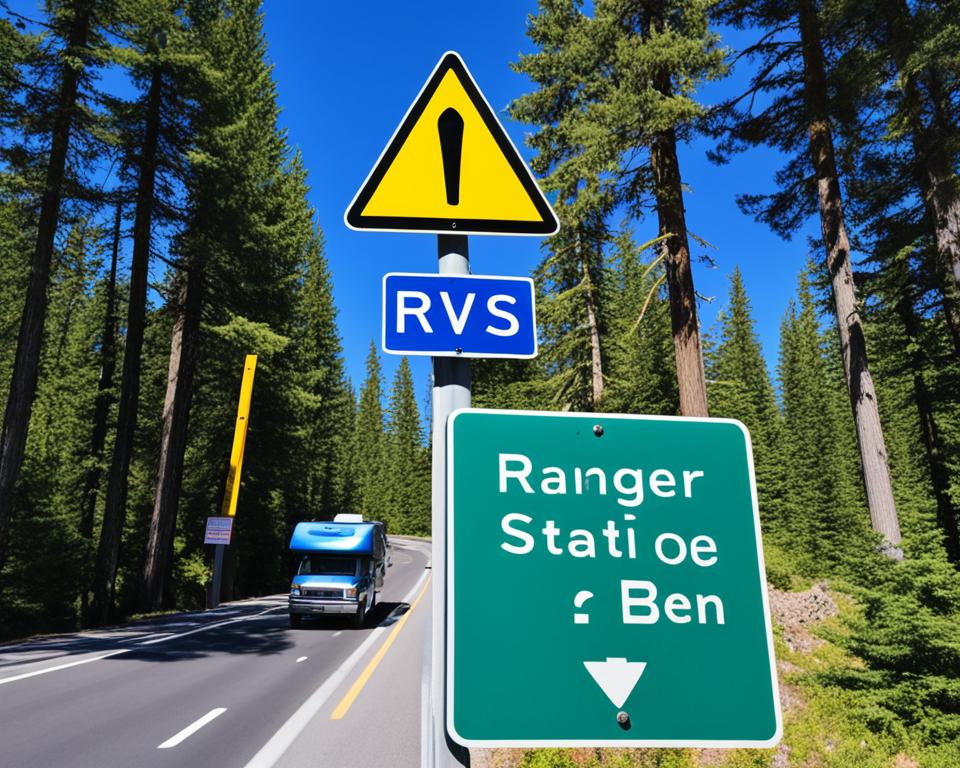
The Concept of Shared Vehicles
The concept of shared vehicles is a growing trend in urban areas, where multiple individuals share the same vehicle for transportation purposes. Shared vehicles offer a range of benefits, including cost savings, reduced traffic congestion, and environmental sustainability.
One of the key benefits of the shared vehicle concept is cost savings. By sharing the cost of vehicle ownership, individuals can significantly reduce their expenses compared to owning a vehicle individually. This includes expenses such as purchase costs, insurance, maintenance, and parking fees.
Shared vehicles also contribute to reduced traffic congestion. By encouraging carpooling and ride-sharing, shared vehicle programs help to decrease the number of vehicles on the road, leading to less traffic and shorter commute times. This can improve overall transportation efficiency and reduce the negative impacts of congestion on the environment and people’s daily lives.
Furthermore, shared vehicles promote environmental sustainability. By maximizing the utilization of vehicles through sharing, fewer cars are needed on the road, resulting in a decreased carbon footprint. This can help combat air pollution and mitigate the environmental impacts associated with individual car ownership, such as fuel consumption and emissions.
Shared vehicles are typically managed through online platforms or specialized services that facilitate vehicle sharing arrangements among participants. These platforms allow individuals to connect with others who are willing to share their vehicles or join existing car-sharing programs.
“Sharing a vehicle not only saves money but also reduces traffic and benefits the environment. It’s a win-win situation for both individuals and the community.”
Shared vehicles are particularly beneficial in densely populated urban areas where parking spaces are limited and the cost of owning a vehicle is high. It provides an alternative transportation solution that is flexible, convenient, and economically viable.
Benefits of Shared Vehicles:
- Cost savings through shared ownership and reduced expenses
- Decreased traffic congestion and shorter commute times
- Environmental sustainability and reduced carbon footprint
- Flexibility and convenience for urban dwellers
- Access to a wide range of vehicle options without the commitment of ownership
The shared vehicle concept offers a sustainable and practical solution to transportation challenges in urban areas. By embracing shared vehicle programs, individuals can enjoy the benefits of cost savings, reduced traffic congestion, and environmental responsibility.
RV Parks and Accommodations
RV parks are dedicated areas designed to accommodate RVs. These parks offer a range of services and amenities to ensure a comfortable and enjoyable stay for RV travelers.
One of the key features of RV parks is the availability of hookups for water and electricity. This allows RV owners to conveniently access these essential resources during their stay. Whether it’s to refill water tanks or recharge batteries, having access to these hookups makes RV living more convenient.
RV parks also provide dump stations for waste disposal. These stations are equipped with facilities to safely and hygienically dispose of the RV’s wastewater and sewage. This ensures that RV travelers can maintain cleanliness and hygiene throughout their journey.
In addition to essential services, RV parks often offer a range of recreational facilities to enhance the camping experience. These facilities may include swimming pools, playgrounds, picnic areas, and even hiking trails. RV travelers can take advantage of these amenities to relax, have fun, and connect with nature.
Furthermore, RV parks prioritize safety and security. They often have gated entrances and security personnel to ensure a safe environment for both RV owners and their vehicles. This provides peace of mind for travelers, allowing them to fully enjoy their RV adventures.
RV parks are popular among RV travelers due to their convenient locations, amenities, and services. They provide a safe and comfortable place to park, connect with fellow RV enthusiasts, and experience the RV lifestyle.
Considerations for RV Ownership
When it comes to owning an RV, there are several important considerations to keep in mind. Beyond the initial cost of purchasing the RV itself, owners need to think about the ongoing maintenance and storage requirements. Regular maintenance is crucial to ensure that the RV remains in optimal condition, providing a safe and enjoyable travel experience for years to come. Additionally, finding a suitable storage space for times when the RV is not in use is essential to protect the vehicle from the elements and extend its lifespan.
Maintenance of an RV involves routine inspections, servicing, and repairs to keep all systems and components in proper working order. This includes checking the engine, electrical systems, plumbing, and propane systems, among other things. Addressing any issues promptly can help prevent more significant problems down the line and ensure that the RV is always ready for the next adventure.
Aside from regular maintenance, it’s important to be aware of specific maintenance tasks that may vary depending on the type of RV you own. For example, motorhomes with built-in engines require regular oil changes, filter replacements, and tire rotations, similar to traditional vehicles. On the other hand, towable RVs like campers and fifth wheels may require additional attention to the towing equipment and hitch connections.
In terms of storage, RV owners need to find a suitable location to keep their vehicles when not in use. This can be a challenging task, as RVs are larger and require more space compared to standard vehicles. Options for RV storage include renting a storage space at a dedicated RV storage facility, storing the RV on your own property if local regulations permit, or utilizing a storage solution specifically designed for RVs, such as covered storage or RV storage lots.
Here is a table summarizing the main considerations for RV ownership:
| Considerations | Description |
|---|---|
| Maintenance | Regular inspections, servicing, and repairs to keep the RV in optimal condition |
| Type-Specific Maintenance | Additional maintenance tasks based on the type of RV (e.g., motorhomes, campers, fifth wheels) |
| Storage | Finding a suitable location to store the RV when not in use |
By considering these factors and taking proactive steps, RV owners can enjoy their vehicles to the fullest and ensure the longevity and reliability of their investment.
Conclusion
In conclusion, recreational vehicles (RVs) offer a unique and versatile way to travel, allowing individuals to experience the freedom of the open road. With various types and features available, RVs provide convenience, cost savings, and the ability to bring along all the comforts of home.
As defined earlier, RVs are vehicles designed for both travel and accommodation purposes, including motorhomes, campers, and fifth wheels. Motorhomes are integrated units providing access to the entire living space while driving, while campers are towed behind a vehicle and can be detached at the camping spot. Fifth wheels are large campers that attach to a pickup truck.
Whether renting or owning an RV, individuals can enjoy the benefits of RV travel. This includes cost savings as RV owners have their accommodations and can avoid expensive hotel stays. RVs also provide the convenience of a kitchen, allowing travelers to cook their meals and save on dining out expenses. Additionally, RVs offer ample storage space for personal belongings, making it easy to pack and travel comfortably.
Overall, RV travel allows individuals to explore new destinations, create lasting memories, and enjoy the comforts of home on the go. It is a lifestyle that offers freedom, flexibility, and adventure, making it an appealing choice for those seeking unique travel experiences.
FAQ
What is a recreational vehicle (RV)?
A recreational vehicle, commonly known as an RV, is a type of vehicle that is designed for both travel and accommodation purposes.
What are the different types of RVs?
There are different types of RVs, including motorhomes, campers, and fifth wheels.
What is a motorhome?
A motorhome is an integrated unit that provides access to the entire living space while driving.
What is a camper?
A camper is a specialty trailer that is towed behind a vehicle and can be detached at the camping spot.
What is a fifth wheel?
A fifth wheel is a large camper that attaches to a pickup truck via a special mount.
What are the benefits of traveling with an RV?
Traveling with an RV offers benefits such as cost savings, convenience of a kitchen, and more storage space for personal belongings.
What amenities are available in an RV?
RVs come equipped with amenities such as beds, bathrooms, and kitchen facilities.
Should I try RV travel before buying one?
Yes, it is advisable to try RV travel by renting one to experience the benefits and functionality before committing to a purchase.
Are there any regulations for RV travel?
Yes, it is important to be aware of traffic regulations, speed limits, and parking restrictions specific to RVs when traveling.
What is the concept of shared vehicles?
The concept of shared vehicles refers to the practice of multiple individuals sharing the same vehicle for transportation purposes, offering benefits such as cost savings and reduced traffic congestion.
What are RV parks?
RV parks are dedicated areas designed to accommodate RVs, offering services and amenities such as hookups for water and electricity, dump stations for waste disposal, and recreational facilities.
What considerations should I keep in mind for RV ownership?
Along with the initial cost of purchasing an RV, consider maintenance and storage costs, as well as finding a suitable storage space when the RV is not in use.

